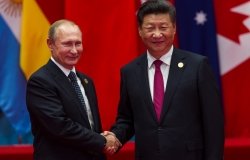China's Third Plenum: What You Need to Know

In recent decades, Third Plenums have come to be seen as meetings at which China’s Communist Party (CCP) is most likely to launch transformational policies. This occurred in 1978, when Deng Xiaoping set China on the road to reform, and again in 1993.
Expectations for this year’s meetings, which will be held from November 9 to 12 in Beijing, are extraordinarily high, for two reasons. The first is that there is a consensus in China that continued improvements to the nation’s wealth, well-being, and power require a restructuring of the economy. The model which has been so successful over the past 20 years, based on manufacturing for export, environmental degradation, and low wages, must be replaced by an economy based on domestic consumption, more equitable distribution of wealth, a cleaner, safer environment, and provision of public goods. It’s a tall order, but the CCP seems convinced that the risk of restructuring is lower than the danger of pretending that the old model still works.
The second reason that expectations are high is that Communist Party General Secretary Xi Jinping and Premier Li Keqiang have been raising them in recent weeks. It is rare for China’s leaders to signal that Party conclaves will result in “historic,” “transformational,” and “comprehensive” new policies, but that is what Xi and Li have been doing. Chinese public intellectuals, think tanks, and media have responded with policy papers, op-eds, and other proposals both public and secret which indicate their confidence that major reforms are coming and that leaders will listen to the peoples’ advice.
Most of these proposals have been limited to the economic and social welfare spheres. Chinese who hoped that Xi would champion political reform have been disappointed over the past year by crackdowns on free speech, academic freedom, dissidents, and the Internet. It appears that for Xi, as for Deng Xiaoping, political reform was achieved in 1949. There is a Chinese phrase for Xi’s attitude, 政左经右, or “leftist politics, rightist economics.” Some Chinese and foreign observers still hold out hope that Xi is a political moderate at heart and that he is cracking down in the political sphere in order to give himself cover for radical reforms in the economic sphere. As Roderigo said: “It hath not appeared.” Still, for most Chinese, there is scant difference between economic and political reform; any policies that truly restructure China’s economy will transform its polity as well.
No one outside the CCP inner circle knows what direction Xi Jinping will take at the Plenum. He is unlikely to present a detailed platform, so listeners will sift through generalities for clues about which risks Xi will prioritize and which special interests he will harm to set China on a more sustainable course. He has no easy choices. There is no more low-hanging fruit. But, in a land without votes or polling, it seems that Xi has the support of most of his people, or most of the urban elites, and that he may have the skill and will to lead China into its next era.
What reforms will people be listening for and what risks will the CCP run in advocating for them? The primer below (PDF) is offered only as a beginner’s guide to Plenum-watching. No prediction in regard to the Third Plenum’s outcome is ventured. We’ll have to wait a year or two after the meeting and see whose oxen Xi is willing to gore before we can accurately judge his intentions.
Documents & Downloads
About the Author

Robert Daly
Robert Daly, the Director of the Wilson Center’s Kissinger Institute on China and the United States, has compiled an unusually diverse portfolio of high-level work: He has served as a US diplomat in Beijing; as an interpreter for Chinese and US leaders, including President Carter and Secretary of State Kissinger; as head of China programs at Johns Hopkins, Syracuse, and the University of Maryland; and as a producer of Chinese-language versions of Sesame Street. Recognized East and West as a leading authority on Sino-US relations, he has testified before Congress, lectured widely in both countries, and regularly offers analysis for top media outlets.
Read More
Kissinger Institute on China and the United States
The Kissinger Institute works to ensure that China policy serves American long-term interests and is founded in understanding of historical and cultural factors in bilateral relations and in accurate assessment of the aspirations of China’s government and people. Read more










